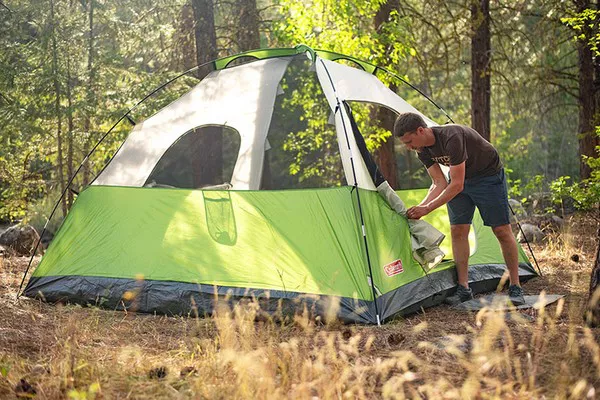In recent years, the allure of stealth camping has grown among outdoor enthusiasts seeking solitude and a deeper connection with nature. Stealth camping, often defined as setting up camp in remote or off-trail locations without permission, presents an appealing alternative to traditional campgrounds. However, despite its apparent appeal, stealth camping remains illegal in many areas. To comprehend the rationale behind these regulations, it’s crucial to delve into the environmental, safety, and legal considerations that underpin such restrictions.
Environmental Impact and Conservation Concerns
One of the primary reasons why stealth camping is prohibited in various regions is its potential to cause environmental degradation. Unlike established campgrounds equipped with designated tent sites, fire rings, and waste disposal facilities, stealth campsites lack the necessary infrastructure to mitigate environmental impact.
When campers venture off-trail to find secluded spots, they often trample fragile vegetation, disturb wildlife habitats, and exacerbate soil erosion. The cumulative effect of unregulated camping can lead to lasting damage to ecosystems, particularly in delicate environments such as alpine regions or coastal dunes. In protected areas like national parks or wildlife reserves, conservation efforts hinge on minimizing human impact. Consequently, unauthorized camping is restricted to safeguard biodiversity and preserve pristine landscapes for future generations.
Safety Concerns for Campers and Emergency Responders
Beyond ecological considerations, the prohibition of stealth camping is rooted in concerns for camper safety and emergency response capabilities. Remote camping locations, although enticing for their seclusion, often lack the essential amenities and safety measures provided at established sites.
In wilderness areas, campers might inadvertently choose hazardous spots prone to rockfalls, flash floods, or wildlife encounters. Furthermore, the absence of clear trails or marked boundaries can pose navigation challenges, increasing the risk of getting lost or injured. In emergency situations, such as medical crises or natural disasters, locating and assisting stealth campers becomes markedly more difficult for rescue teams. By confining camping activities to designated areas, authorities aim to minimize these safety risks and ensure timely assistance when needed.
Preservation of Cultural and Historical Sites
Another critical factor contributing to the illegality of stealth camping pertains to the protection of cultural and historical sites. Many wilderness areas harbor ancient petroglyphs, archaeological remnants, or sacred grounds significant to indigenous communities. These sites, often fragile and vulnerable to human interference, require stringent conservation measures to prevent inadvertent damage or desecration.
Stealth campers, unaware of the historical value of their surroundings, might unknowingly trespass on culturally sensitive areas, leading to irreparable harm. Prohibiting camping outside designated zones serves to safeguard these heritage sites, respecting the cultural significance they hold for indigenous groups and preserving them as educational resources for future study.
Legal Considerations and Land Management Policies
From a legal standpoint, the regulation of camping activities aligns with broader land management policies aimed at balancing recreational use with conservation imperatives. Public lands, such as national forests or state parks, are governed by specific regulations that dictate permissible activities and land use practices. These regulations, established through extensive public consultation and ecological assessments, seek to optimize the ecological, recreational, and economic benefits derived from these landscapes.
Unauthorized camping not only contravenes established regulations but also undermines the integrity of land management strategies. By adhering to designated camping areas, visitors contribute to sustainable land stewardship and ensure equitable access for all outdoor enthusiasts. Compliance with these regulations fosters a sense of collective responsibility towards our natural heritage, promoting the longevity of outdoor recreation opportunities.
Community and Local Impact
The impact of stealth camping extends beyond environmental and legal dimensions; it also resonates with local communities and stakeholders. Rural areas adjacent to popular camping destinations often experience strain on resources and infrastructure due to unregulated camping activities.
Stealth campers may inadvertently trespass on private property, disrupting local livelihoods and straining community relations. Moreover, the accumulation of litter and waste associated with rogue camping can burden sanitation services and compromise water quality. To mitigate these adverse effects, authorities collaborate with local stakeholders to promote responsible tourism practices and allocate resources efficiently.
Promoting Ethical and Sustainable Outdoor Recreation
Ultimately, the prohibition of stealth camping underscores a broader commitment to fostering ethical and sustainable outdoor recreation. By encouraging campers to utilize designated campsites equipped with necessary amenities, land management agencies promote responsible behavior and environmental stewardship.
Education and outreach initiatives play a pivotal role in cultivating a culture of respect for natural landscapes and indigenous heritage. Through public engagement and awareness campaigns, outdoor enthusiasts are empowered to make informed decisions that prioritize environmental conservation and minimize their ecological footprint. By embracing sustainable camping practices, we collectively contribute to the preservation of our planet’s natural splendor for generations to come.
Conclusion
In conclusion, the illegality of stealth camping reflects a comprehensive approach to land management that prioritizes ecological integrity, visitor safety, and cultural preservation. While the allure of secluded campsites beckons adventurers, adhering to established regulations ensures the longevity and accessibility of outdoor recreation opportunities. By embracing responsible camping practices and respecting conservation guidelines, outdoor enthusiasts can forge a harmonious relationship with nature while safeguarding its treasures for posterity.

